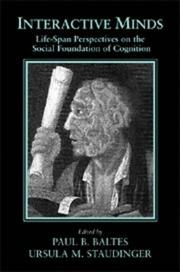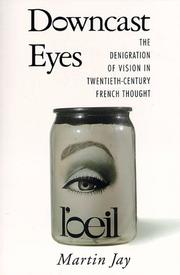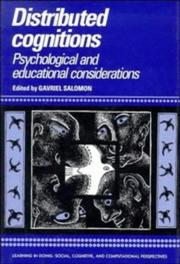| Listing 1 - 9 of 9 |
Sort by
|
Book
ISBN: 2738108911 9782738108913 Year: 2000 Volume: 2 Publisher: Paris: Odile Jacob,
Abstract | Keywords | Export | Availability | Bookmark
 Loading...
Loading...Choose an application
- Reference Manager
- EndNote
- RefWorks (Direct export to RefWorks)
"L'Université de tous les savoirs est une série de trois cent soixante-six conférences sur les sciences, les techniques, les sociétés, les productions de l'esprit et les cultures, données chaque jour de l'année 2000 par les plus grands spécialistes"
Social problems --- Human beings --- Human behavior --- Cognition and language --- Cognition and culture --- Philosophical anthropology --- Homme --- Individu et société. --- Anthropologie. --- Sociologie. --- Évolution. --- Université de tous les savoirs-la suite
Book
ISBN: 9782711201495 271120149X Year: 2019 Publisher: Paris: Les arènes,
Abstract | Keywords | Export | Availability | Bookmark
 Loading...
Loading...Choose an application
- Reference Manager
- EndNote
- RefWorks (Direct export to RefWorks)
"Toute sa vie, l'être humain ne cesse d'apprendre au contact d'autrui, d'imiter, de reproduire, de recombiner différentes idées ou savoir-faire - et de les transmettre. Depuis les premiers chasseurs-cueilleurs jusqu'à l'invention d'Internet, le long processus d'évolution de notre espèce ne peut'expliquer qu'à la lumière de cette spécificité que l'on appelle l'intelligence collective, ou plus simplement la culture. Privé de l'accès à cette source de savoir accumulée au fil des générations et adaptée aux environnements locaux, l'être humain serait incapable de survivre. Passant de l'anthropologie et de l'histoire à la psychologie, la biologie ou encore la génétique, Joseph Henrich démontre de manière magistrale et convaincante pourquoi l'être humain est la seule espèce à avoir atteint un tel degré de développement."
Homme --- Intelligence sociale. --- Civilisation. --- Évolution. --- Human evolution. --- Social evolution. --- Behavior evolution. --- Cognition and culture. --- Human evolution --- Social evolution --- Behavior evolution --- Cognition and culture --- Évolution (biologie) --- Anthropologie --- Intelligence collective dans les organisations --- Psychologie sociale --- Human behavior --- Evolution (Biology) --- Anthropology --- Social psychology --- Swarm intelligence
Book
ISBN: 3261040378 9783261040374 Year: 1991 Publisher: Berne: Lang,
Abstract | Keywords | Export | Availability | Bookmark
 Loading...
Loading...Choose an application
- Reference Manager
- EndNote
- RefWorks (Direct export to RefWorks)
Cognition and culture --- Intellect --- Cognition in children --- Cognition et culture --- Intelligence --- Cognition chez l'enfant --- Social aspects --- Aspect social --- social behaviour --- Cognition --- Psychology --- Teaching --- Children --- Teaching methods --- Cognition - Social aspects --- Psychopedagogie --- Retro-action

ISBN: 0521485673 9780521485678 Year: 1996 Publisher: Cambridge (Mass.): University press Bologna,
Abstract | Keywords | Export | Availability | Bookmark
 Loading...
Loading...Choose an application
- Reference Manager
- EndNote
- RefWorks (Direct export to RefWorks)
Cognitie en cultuur --- Cognition [Social ] --- Cognition and culture --- Cognition et culture --- Cognition sociale --- Interpersonal perception --- Perceptie [Sociale ] --- Perception interpersonnelle --- Perception sociale --- Social cognition --- Social perception --- Sociale perceptie --- Sociale waarneming --- Waarneming [Sociale ] --- Culture and cognition --- Cognition --- Culture --- Ethnophilosophy --- Ethnopsychology --- Socialization --- Cognition, Social --- Interpersonal relations --- Perception --- Social cognitive theory
Book
ISBN: 9780745605975 9780745610153 Year: 2011 Publisher: Cambridge Polity press
Abstract | Keywords | Export | Availability | Bookmark
 Loading...
Loading...Choose an application
- Reference Manager
- EndNote
- RefWorks (Direct export to RefWorks)
Ethnophilosophy --- #SBIB:316.21H21 --- #SBIB:316.21H32 --- #SBIB:316.7C120 --- 316.2 BOURDIEU, PIERRE --- 316.2 BOURDIEU, PIERRE Sociologische richtingen. Sociologische scholen. Sociologen--BOURDIEU, PIERRE --- Sociologische richtingen. Sociologische scholen. Sociologen--BOURDIEU, PIERRE --- Folk philosophy --- Indigenous peoples --- Philosophy, Primitive --- Primitive philosophy --- Cognition and culture --- Ethnology --- Philosophy --- Theoretische sociologie: kritische theorie en de Frankfurter Schule --- Theoretische sociologie: het actionalisme --- Cultuursociologie: algemene en theoretische werken

ISBN: 1283646234 0520915380 0585200467 9780520915381 9780585200460 0520081544 9780520088856 9780520081543 0520088859 9781283646239 Year: 1993 Publisher: Berkeley : University of California Press,
Abstract | Keywords | Export | Availability | Bookmark
 Loading...
Loading...Choose an application
- Reference Manager
- EndNote
- RefWorks (Direct export to RefWorks)
Long considered "the noblest of the senses," vision has increasingly come under critical scrutiny by a wide range of thinkers who question its dominance in Western culture. These critics of vision, especially prominent in twentieth-century France, have challenged its allegedly superior capacity to provide access to the world. They have also criticized its supposed complicity with political and social oppression through the promulgation of spectacle and surveillance. Martin Jay turns to this discourse surrounding vision and explores its often contradictory implications in the work of such influential figures as Jean-Paul Sartre, Maurice Merleau-Ponty, Michel Foucault, Jacques Lacan, Louis Althusser, Guy Debord, Luce Irigaray, Emmanuel Levinas, and Jacques Derrida. Jay begins with a discussion of the theory of vision from Plato to Descartes, then considers its role in the French Enlightenment before turning to its status in the culture of modernity. From consideration of French Impressionism to analysis of Georges Bataille and the Surrealists, Roland Barthes's writings on photography, and the film theory of Christian Metz, Jay provides lucid and fair-minded accounts of thinkers and ideas widely known for their difficulty. His book examines the myriad links between the interrogation of vision and the pervasive antihumanist, antimodernist, and counter-enlightenment tenor of much recent French thought. Refusing, however, to defend the dominant visual order, he calls instead for a plurality of "scopic regimes." Certain to generate controversy and discussion throughout the humanities and social sciences, Downcast Eyes will consolidate Jay's reputation as one of today's premier cultural and intellectual historians.
Vision. --- Cognition and culture. --- Philosophy, French --- Eyesight --- Seeing --- Sight --- Senses and sensation --- Blindfolds --- Eye --- Physiological optics --- Culture and cognition --- Cognition --- Culture --- Ethnophilosophy --- Ethnopsychology --- Socialization --- France --- Civilization --- Intellectual life --- Cognition and culture --- Vision --- Perception (Philosophy) --- Philosophie française --- Cognition et culture --- Perception (Philosophie) --- History --- Philosophy --- Histoire --- Philosophie --- Civilisation --- Vie intellectuelle --- CDL --- 130.2 --- 20th century. --- 5 senses. --- academic. --- criticism. --- cultural history. --- cultural studies. --- culture. --- descartes. --- disability studies. --- emmanuel levinas. --- enlightenment. --- five senses. --- france. --- french enlightenment. --- global. --- guy debord. --- jacques derrida. --- jacques lacan. --- jean paul sartre. --- louis althusser. --- luce irigaray. --- maurice merleau ponty. --- michel foucault. --- modernity. --- oppression. --- plato. --- political. --- politics. --- scholarly. --- seeing. --- sight. --- social history. --- social studies. --- surveillance. --- theory. --- vision impaired. --- vision. --- western culture. --- western world. --- Perception (philosophie) --- Image (philosophie) --- 1870-1914 --- 20e siècle

ISBN: 0521414067 Year: 1993 Volume: *1 Publisher: Cambridge [England] New York, NY Cambridge University Press
Abstract | Keywords | Export | Availability | Bookmark
 Loading...
Loading...Choose an application
- Reference Manager
- EndNote
- RefWorks (Direct export to RefWorks)
Cognitie en cultuur --- Cognition and culture --- Cognition et culture --- Connaissance [Sociologie de la ] --- Kennis [Sociologie van de ] --- Knowledge [Sociology of ] --- Sociologie van de kennis --- Sociology of knowledge --- Knowledge, Sociology of --- Cognition --- -Learning, Psychology of --- -#PEDA *015.3 --- #PEDA *P 1.5 --- Learning --- Psychology of learning --- Educational psychology --- Comprehension --- Learning ability --- Psychology --- Knowledge, Theory of (Sociology) --- Communication --- Knowledge, Theory of --- Public opinion --- Sociology --- Social epistemology --- Culture and cognition --- Culture --- Ethnophilosophy --- Ethnopsychology --- Socialization --- Social aspects --- Psychological aspects --- Distributed cognition. --- Learning, Psychology of --- Sociale psychologie --- Social aspects. --- sociale cognitie --- sociale cognitie. --- Learning [Psychology of ] --- Learning, Psychology of - Social aspects. --- -Knowledge, Theory of (Sociology) --- -Learning --- -Social aspects
Book
ISBN: 9782804163877 2804163873 Year: 2011 Volume: *39 Publisher: Bruxelles De Boeck
Abstract | Keywords | Export | Availability | Bookmark
 Loading...
Loading...Choose an application
- Reference Manager
- EndNote
- RefWorks (Direct export to RefWorks)
Cognitive psychology --- Cognitie en taal --- Cognitieve neurowetenschap --- Cognitieve psychologie --- Cognitieve wetenschap --- Cognition and language --- Cognition et langage --- Cognitive neuropsychology --- Cognitive neuroscience --- Cognitive science --- Langage [Psychologie du ] --- Langage et langues--Aspect psychologique --- Langage et langues--Psychologie --- Langage et psychanalyse --- Langage--Aspects psychologiques --- Langage--Psychologie --- Language and psychoanalysis --- Language--Psychological aspects --- Language--Psychology --- Langues--Psychologie --- Mental representation --- Mentale voorstelling --- Mentalisation --- Neuropsychologie cognitive --- Neuroscience cognitive --- Neurosciences cognitives --- Parole--Psychologie --- Psychanalyse et langage --- Psychoanalyse en taal --- Psychoanalysis and language --- Psycholinguistics --- Psycholinguistique --- Psychologie [Cognitieve ] --- Psychologie cognitive --- Psychologie du langage --- Psychologie van de taal --- Psychology [Cognitive ] --- Representation [Mental ] --- Représentation (Psychologie) --- Représentation mentale --- Sciences cognitives --- Taal en psychoanalyse --- Taal--Psychologie --- Taal--Psychologische aspecten --- Taalpsychologie --- Voorstelling [Mentale ] --- Wetenschap [Cognitieve ] --- Mental representation. --- Cognition. --- Cognition --- Représentation mentale --- Cognition and culture --- Written communication --- Psychological aspects
Book
ISBN: 2070772632 9782070772636 Year: 2006 Publisher: Paris: Gallimard,
Abstract | Keywords | Export | Availability | Bookmark
 Loading...
Loading...Choose an application
- Reference Manager
- EndNote
- RefWorks (Direct export to RefWorks)
Seul l'Occident moderne s'est attaché à classer les êtres selon qu'ils relèvent clos lois de la matière ou des aléas des conventions. L'anthropologie n'a pas encore pris la mesure de ce constat : dans la définition même de son objet - la diversité culturelle sur fond d'universalité naturelle -. elle perpétue une opposition dont les peuples qu'elle étudie ont fait l'économie. Peut-on penser le monde sans distinguer la culture de la nature ? Philippe Descola propose ici une approche nouvelle des manières de répartir continuités et discontinuités entre l'homme et son environnement. Son enquête met en évidence quatre façons d'identifier les " existants " et de les regrouper à partir de traits communs qui se répondent d'un continent à l'autre : le totémisme, qui souligne la continuité matérielle et morale entre humains et non-humains ; l'analogisme, qui postule entre les éléments du monde un réseau de discontinuités structuré par des relations de correspondances ; l'animisme, qui prête aux non-humains l'intériorité des humains, mais les en différencie par le corps ; le naturalisme qui nous rattache au contraire aux non-humains par les continuités matérielles et nous en sépare par l'aptitude culturelle. La cosmologie moderne est devenue une formule parmi d'autres. Car chaque mode d'identification autorise des configurations singulières qui redistribuent les existants dans des collectifs aux frontières bien différentes de celles que les sciences humaines nous ont rendues familières. C'est à une recomposition radicale de ces sciences et à un réaménagement de leur domaine que ce livre invite, afin d'y inclure bien plus que l'homme, tous ces " corps associés " trop longtemps relégués dans une fonction d'entourage.
572 --- 130.2 --- 502 --- 502 Nature. Nature study and conservation. Nature and wildlife protection --- Nature. Nature study and conservation. Nature and wildlife protection --- 130.2 Filosofie van de cultuur. Cultuurfilosofie. Cultuursystemen. Kultuurfilosofie --- Filosofie van de cultuur. Cultuurfilosofie. Cultuursystemen. Kultuurfilosofie --- Anthropology --- Philosophy of nature --- Human ecology --- Human ecology. --- Philosophy of nature. --- Philosophie de l'homme --- Écologie humaine --- Philosophie de la nature --- Philosophie de la culture --- Cognition and culture --- Culture --- Philosophical anthropology --- Ecologie humaine --- Cognition et culture --- Anthropologie philosophique --- Philosophy --- Philosophie --- Philosophie de l'homme. --- Écologie humaine. --- Philosophie de la nature. --- Philosophie de la culture. --- nature --- culture --- l'Occident moderne --- anthropologie --- la diversité culturelle --- universalité naturelle --- homme et environnement --- totémisme --- analogisme --- animisme --- naturalisme --- cosmologie --- sciences humaines
| Listing 1 - 9 of 9 |
Sort by
|

 Search
Search Feedback
Feedback About UniCat
About UniCat  Help
Help News
News